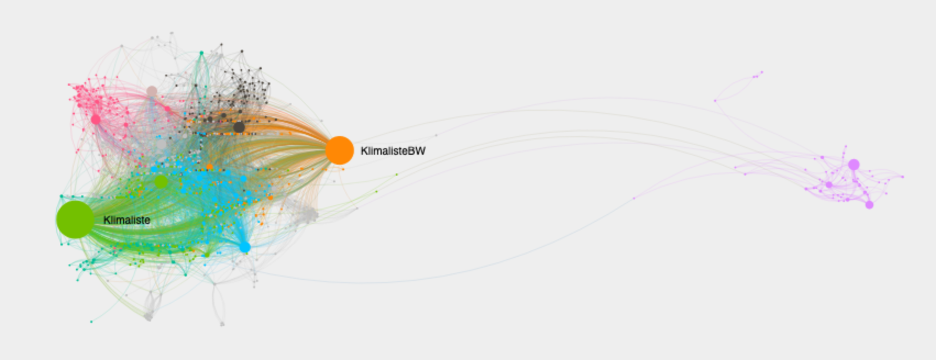Climate-Related Conversation on Twitter in the German State Elections
22nd April 2021
By Christian Schwieter and Nicolás Heyden
Ahead of the 14 March 2021 German state elections in Baden-Württemberg (BaWü) and Rheinland-Pfalz (RLP), ISD analysts examined climate-related discussion on social media. The goal was to interrogate how social media drives climate-related debate during an election period, and to test methodological techniques that could be used to monitor online activity in the lead up to the German Federal Elections later this year.
This article provides a network analysis of the most prominent clusters of Twitter accounts involved in this discussion. It highlights the structure of online discourses around the BaWü and RLP elections, as well as the varying degrees of polarisation of online conversations. The methodology used is outlined at the end of the article.
* This article serves as a follow-up to The Salience of Climate Issues in the German State Elections and should be read in the context of those findings; the underlying dataset remains the same. ________________________________________________________________________
How to interpret the network
The following network visualisations display a Twitter-mentions network analysis in the context of the BaWü and RLP elections, whereby each node (circle) represents one user that mentioned, or was mentioned by, another user and each edge (line) represents a connection between two nodes.
On Twitter, a mention is signified by the ‘@’ sign and replies to tweets are also counted as mentions of the original user. For example, if user A posted a tweet and user B replied to this tweet, this would be counted as user B mentioning user A. Put differently, user B replying to user A would create a line sent out by B to A.
The node size corresponds to the number of times this user has been mentioned by others (the in-degree) and the colour of the node represents which user communities – “clusters” – the user belongs to. Clusters were generated by the Leiden algorithm, which assesses which users frequently mention the same users. Applied across the network, the colours represent the different clusters.
Climate-related Election Conversation on Twitter

The Twitter mention network of climate-related conversation during the BaWü and RLP elections.
Largest clusters and their key members
| Cluster | Cluster description | % of users in the network |
 |
This cluster consists of accounts from the conservative and far-right spectrum in Germany. There were three prominent figures in this cluster: the AfD candidate for the Bundestag Malte Kaufmann, the far-right journalist Boris Reitschuster, and the blogger Ethem S., alias Jonas Danner. Analysts also identified a private account named Inspector Brunel which frequently framed the new #Infektionsschutzgesetz (law for the protection from infection) as a step towards authoritarianism. | 17% |
   |
This cluster predominantly consists of activists and political party accounts from CDU and Klimaliste (a party founded by school climate strikers). Prominent figures in this cluster are Maurice Conrad from Fridays for Future and SPD´s federal group leader Norbert Walter-Borjans. Analysts also identified a private account that sat between social activism and a far-left political orientation. | 12% |
   |
This cluster is dominated by Klimaliste accounts; namely Klimaliste Rheinland-Pfalz and two of Klimaliste Baden-Württemberg’s candidates, Sissi de Acosta and Christoph Haberl. Analysts also identified a private account whose bio suggested strong commitment to climate protection, Antifa and Corona-lockdown. | 11% |
   |
This cluster again predominantly consists of political party accounts: Die Grüne in Baden-Württemberg as well as Die Grüne´s group leader in Lower Saxony, Christian Meyer, as well as the Greens in the European Parliament and CDU in Baden-Württemberg. Analysts identified the account of TAZ journalist Peter Unfried, who appears to commit to climate policies in his bio. | 8% |
   |
This cluster exclusively consists of climate and social activists, including the political party account of Klimaliste Baden-Württemberg. Prominent members of this cluster are Caro Rackete – famous for rescuing refugees in the Mediterranian Sea -, president of the Bundesverband Erneuerbare Energie (BEE) Simone Peter, Scientists for Future member Jakob Gemassmer, as well as Klimaliste´s co-founder Sebastian Hornschild. | 7% |
Overall Election Conversation on Twitter


The Twitter mention network of election-related conversation during the BaWü and RLP elections.
Largest clusters and their key members
| Cluster | Cluster description | % of users in the network |
   |
This cluster is dominated by AfD accounts, namely the main party account, AfD candidate for Bundestag Malte Kaufmann, and two of AfD Baden-Württemberg´s candidates, Stephan Schwarz and Johann Martel. Another prominent figure is far-right blogger Niklas Lotz. | 21% |
   |
This cluster constituted the polar opposite cluster 0. Two accounts are specifically dedicated to expose the AfD, including a research group called Die Insider. The cluster also contains two private accounts committed to climate protection and LGBTQ+. A prominent figure within this cluster is SPD´s candidate for Bundestag, Derya Türk-Neubaur. | 8% |
   |
This cluster predominantly consists of political accounts from Rheinland-Pfalz, namely the regional party accounts of CDU and SPD as well as the group leader of SPD Rheinland-Pfalz, Alexander Schweitzer. Additionally, the cluster includes the public broadcaster ZDF and Watch Union, which claims to be a watchdog for conservative parties. | 8% |
   |
This cluster predominantly has private accounts that advocate for stricter lockdown rules and vaccination. Some posts also indicate strong criticism against conservatives and neoliberals. One account was deleted before analysts could obtain more information. | 7% |
   |
This cluster is dominated by accounts from Die Linke, namely the main party account and the regional party accounts of Die Linke Rheinland-Pfalz and Baden-Württemberg. Additionally, analysts identified the account of Hanfverband (pro legalization of Cannabis) and Abgeordnetenwatch, a watchdog for lobbying and political corruption. | 6% |
What does this tell us?
The same most prominent user communities emerge within the climate and the overall election networks. Both are largely split into two camps – one containing AfD or far-right users, and the other all remaining parties/affiliations, including climate activists. This suggests that while AfD-related accounts mostly spoke to eachother, accounts supportive of other parties engaged regularly across partisan lines.
In network terms, the purple AfD cluster is highly homogeneous (meaning accounts in this cluster had a shared political affiliation), while the remaining clusters are much more heterogeneous in terms of their political affiliation. The latter insight may provide tentative evidence that policymakers and civil society are theoretically able to reach a large part of the electorate on climate issues – except AfD supporters.
Key findings
Two overarching findings emerge from the analysis. The first is that climate-related conversation on Twitter in the context of the BaWü and RLP elections (as measured by mentions) appears more polarised than the overall election conversation. This can be largely attributed to AfD and far-right accounts rarely engaging with the rest of the political spectrum, but also indicates that far-right online communities are hard to reach on climate topics.
The analysis also suggests that a majority of Twitter users (the clusters and accounts to the political left of the AfD) are conversing frequently on climate issues, which should provide hope for policymakers and civil society actors seeking to promote the climate conversation across party lines.
Methodology
The underlying dataset consists of 61,590 tweets that matched an election keyword list and were posted in the seven days prior to the elections. Out of all of these tweets, 13,058 tweets also matched at least one of our climate keyword list.
For the overall election network, we identified 14,237 accounts (nodes) and a total of 37,826 connections (edges) between those accounts – as indicated by @ mentions or replies. For the climate-related election network, we identified 4,118 accounts (nodes) and a total of 13,202 connections (edges) between those accounts – again as indicated by @ mentions or replies.
Christian Schwieter is an Analyst at ISD Germany, working across projects in the research and policy division. Christian focuses on the quantitative analysis of online political communication, with an emphasis on the effect of online regulation on far-right actors.
Nicolás Heyden is a Research Associate at ISD Germany where he investigates malign influence activities and online extremism in Europe.



